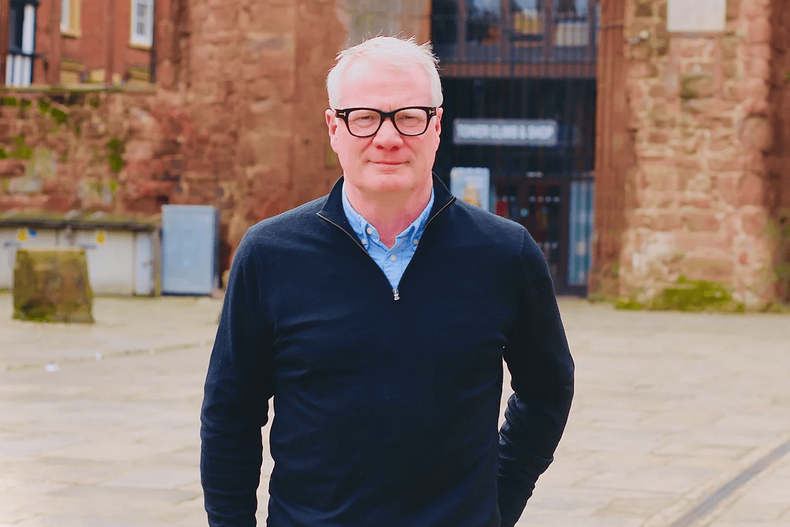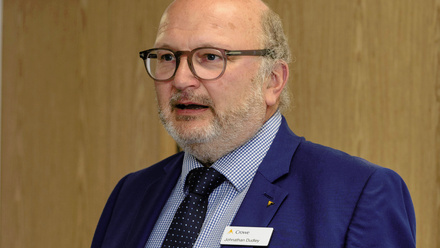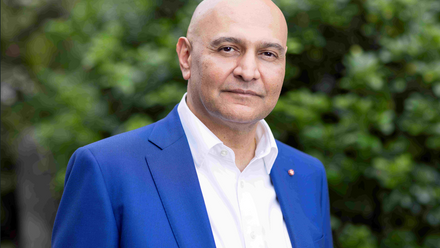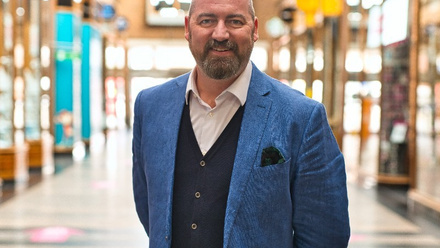What Does Richard Parker’s mayoral manifesto mean for businesses?

Written by the policy department of Greater Birmingham Chambers of Commerce
The final report of the Business Commission West Midlands (BCWM) was launched at a Mayoral Hustings with candidates Andy Street and Richard Parker on 19 March, in which each responded to the 90 recommendations included in the final report of the BCWM. Click here to view the video from this event.
Following on from this event, and with the upcoming Mayoral elections on 2 May, this blog summarises the manifesto of Richard Parker (pictured), Labour Candidate for West Midlands Mayor.
It will outline the key areas of his plan for the West Midlands, what some of the main points mean for businesses, and how they align with the findings of the BCWM research.
About the Business Commission West Midlands
The BCWM provides a roadmap for unlocking business growth across the region. The Commission has been delivered by the Greater Birmingham Chambers of Commerce’s Insight & Intelligence Unit, in partnership with the Black Country and Coventry & Warwickshire Chambers of Commerce.
Between October and November 2023, over 130 organisations participated in the evidence hearing stage of the Commission and a further 400 local businesses were surveyed as part of the evidence base for the Roadmap for Growth. Following the publication of this Roadmap, the Chambers are now working with stakeholders and partners to make the Commission’s recommendations a reality as well as directly supporting businesses in embracing the opportunities and overcoming the challenges identified.
For more information about the BCWM, please click here.
Richard Parker’s Mayoral Pledges
Create 150,000 jobs and training opportunities across the West Midlands
- Apprenticeships guarantee- In his mayoral manifesto, Richard Parker pledges to guarantee a high-quality apprenticeship to every young person that needs one to start their career. He also commits to working with businesses, universities and colleges to ensure that apprenticeships in the West Midlands meet the skills needs of local businesses in key growth areas.
- Skills and training for people who want to retrain into new jobs- Further, Richard Parker’s manifesto states an ambition to support individuals looking to upskill and reskill.
- More well-paid jobs in the West Midlands- Richard Parker emphasises that West Midlands residents ‘should not have to leave where they live to have a career’, and that as such he is committed to ensuring the availability of quality jobs locally. The manifesto emphasises that investing in jobs creation is vital for protecting the region’s long-established manufacturing industry, as well as for developing jobs and industries for the future to support innovation and a green economy.
Revitalise our high streets and bring back pride in our towns & community safety and tackling crime
- Take back empty and boarded up shops for new businesses- Richard Parker’s manifesto envisions that the high streets of the future could have a wider range of functions, including ensuring that people can shop locally, engage in leisure and culture experiences, access business start-up hubs and a mix of vibrant independents and chains, to increase footfall. To facilitate this, he states that as mayor he would look to establish an empty property register to enable such spaces to be promoted and repurposed.
- Make people feel safe again by introducing targeted town centre patrols on high streets blighted by anti-social behaviour and crime- In his manifesto, Richard Parker pledges to recruit 650 more police in the region, appoint a youth worker to every community to enable young people to have a positive role model, and work with the Police and Crime Commissioner, police, Councils, other public sector organisations, and charities to reestablish visible neighbourhood and road policing.
Transport - A transport system that works for people
- Bring buses back into public control- This is a core pledge in Richard Parker’s manifesto, which is justified by evidence to suggest that the public are dissatisfied with the region’s bus services as they are infrequent, unreliable and expensive. The manifesto also pledges to work with communities to design a bus system that works for them (e.g. ensuring a reliable out of hours service to ensure workers in the health and logistics sectors can travel according to their needs), introduce greener busses to reduce pollution and expand ring and ride services to increase accessibility to public transport.
- Trams and Trains- Should he be elected as Mayor, Richard Parker promises to work with the Mayor of the East Midlands to secure and deliver investment for the Midlands Rail Hub to unlock capacity constraints in central Birmingham, improve access to HS2 at Curzon Street, and deliver quicker and more frequent train links across the region. By collaboratively securing and delivering investment for the Midlands Rail Hub, Richard Parker would also seek to re-establish direct services between Coventry and Leicester and Nottingham, and invest in frequency and capacity between Coventry and Leamington Spa. He further commits to opening the Metro extension from Wednesbury to Brierley Hill and investing in the East Birmingham Metro extension to Solihull including a link to the Birmingham International HS2 station to help realise the benefits of HS2 and regenerate the poorest part of the West Midlands region.
- Affordability and convenience- Richard Parker’s manifesto outlines a need for cheaper and more flexible fares to meet the needs of an economy that has embraced hybrid working post-pandemic. This includes investigating hopper fares for people to change busses on the same ticket, rolling out contactless bank card ticketing through all modes of transport, ensuring reliability of public transport at night and looking at cheaper bus travel for children.
Fixing the housing crisis and cracking down on rogue landlords
- Richard Parker pledges to ensure that 20,000 extra homes will be built in the West Midlands by 2031 and to work with councils to crack down on landlords that are providing inadequate standards of housing in the private rented sector. He also commits to ensuring that all homes, both privately owned/rented and social housing, are greener, warmer and cheaper to run, ensuring that the West Midlands has high-quality housing for all. During the BCWM research, improving the supply of housing was one of the asks raised by local businesses. The quality and affordability of housing was highlighted as a key factor in attracting people to develop their careers in the region, especially young people, many of whom have experienced the cost of living crisis most acutely.
In relation to the topics the manifesto has referenced, the BCWM research found that:
Jobs and skills
- Employers are keen to engage people in on-the-job training to ensure they have the skills they need to ensure long-term business growth.
- In today’s fast-moving business world, where technology and skills needs are rapidly evolving, businesses stressed that training their workforce through a blended approach of on-the-job and course-based learning is key to meeting their growth ambitions.
- Firms are keen to make use of the apprenticeship levy to upskill and reskill their workforces, provided that it can be reformed to provide shorter more-flexible courses in a wider range of skill areas.
- Businesses expressed concerns about retaining staff as well as incentivising staff to remain working in the region when there is the temptation of higher salaries in London for certain industries.
High streets
- Businesses across the board were keen to see a revitalisation of the high streets to make the West Midlands a more attractive place to live, with the broader aim of incentivising people to build their careers here instead of London.
- Representatives from the creative industries and the nighttime economy across the West Midlands highlighted that the high risk of crime, especially at night, deters people from visiting cultural venues, which therefore has a profound negative financial and reputational impact on these industries. These industries have called for improved street lighting in high-risk areas, better security on car parks and public transport, and increased police presence around cultural venues during key events.
Transport
- The business community has expressed a keen appetite to work effectively with the successful candidate for Mayor and the Combined Authority to unlock growth through net zero in all areas, including public transport.
- 70 per cent of firms expressed a need for improving public transport networks and it was cited that the region has too many areas that are poorly connected.
- Increased regional capacity and connectivity in the train and tram network is a key priority for businesses, which have expressed frustration about frequent cancellations of services and ‘cold spots’ that remain poorly connected.
- The Government’s decision to curtail HS2 north of Birmingham has been met with strong opposition from the business community due to its negative impact on connectivity and investor confidence in the region. Businesses have called for local authorities to maximise the potential socio-economic value that a project the scale of HS2 generates – with a particular focus on harnessing the wider regeneration opportunities that the delivery of Curzon Street and Interchange Stations bring to the region. They have also called for regional authorities to protect the funding and accelerate the delivery of the Midlands Rail Hub in order to bring about greater inter and intra- regional connectivity.
- During the BCWM research process, representatives from many industries cited that the cost of commuting is a barrier to at least some of their staff coming into work, especially young people and those that need to work in-person more regularly.
Housing
- Improving the supply of housing was one of the asks raised by local businesses. The quality and affordability of housing was highlighted as a key factor in attracting people to develop their careers in the region, especially young people, many of whom have experienced the cost of living crisis most acutely.
Next Steps for the BCWM
The Business Commission West Midlands Hub is published on the Greater Birmingham Chambers of Commerce website and includes reactions to and comments on the Business Commission West Midlands. The Interim Report, which was published in February 2024 and set out the key thematic challenges related to business growth across the region, is also available on the Hub and the Final Report, published in March 2024, lists over 90 recommendations for local, regional and national stakeholders that would help to unlock growth and prosperity across the region.
The Greater Birmingham Chambers of Commerce will use the coming months to engage with local, regional and national political figures and other relevant stakeholders in order to champion and promote the recommendations made in the report. In addition, we will look to undertake deeper dives across the other levers for growth and cross cutting enablers and hold roundtables with relevant regional and national stakeholders. Conducting this exercise will give us a more nuanced understanding of the challenges and opportunities facing businesses in these areas and help track progress against the recommendations we have put forward. In March 2025, we will host a formal review in which we will assess which recommendations have been implemented and where further work is required to unlock growth and drive prosperity across the West Midlands.
Further Information about the West Midlands Mayoral Election
Find out more about the West Midlands Mayoral election.
Candidates for the May 2024 Mayoral Election are listed below (in alphabetical order by surname) with links to web pages with further information on their priorities for the region.
- Siobhan Harper-Nunes, Green Party
- Richard Parker, Labour
- Andy Street, Conservative (incumbent)
- Sunny Virk, Liberal Democrat
- Elaine Williams, Reform UK
- Akhmed Yakoob, Independent (no web page available)



